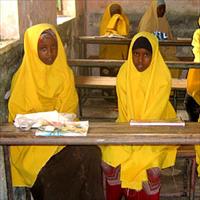SOMALIA: Get more girls in school, activists say

Somalia has one of the worst school-attendance rates in the world and, to mark International Women's Day on 8 March, activists are drawing attention to the fact that only one in four girls gets a primary education, despite an increase in total numbers in school.
“This is a situation that must change rapidly because the education of girls will shape the progress we want to see for Somalia in terms of peace and development," Christian Balslev-Olesen, the representative for the UN Children's Fund (UNICEF) Somalia, said on 7 March.
For the country to achieve the Millennium Development Goals of gender parity and 100 percent enrolment of girls in primary school, he said, "much more must be done - and faster".
Asha Shaur, a women's activist in Somalia, said girls' education was not only important to the girls, but to the entire society.
"They are future mothers who will shape what sort of society we will have," she said. "When they get an education they will teach their children right from wrong. If our women had been educated we would not be in the current mess."
Shaur said that everything must be done to make sure that Somali girls get "as good a chance at education as boys. They truly are the future of this country."
In a statement to mark International Women's Day, the UN Population Fund (UNFPA) called on Somali stakeholders and actors to invest in women and girls.
"Investing in women and girls means putting resources in families and communities, and the returns are high for women themselves, their children and the society at large," the agency stated.
A recent survey conducted by UNICEF on the country's primary education put girls’ gross enrolment at 25 percent while boys’ was 37 percent. The agency said 121,000 Somali girls were currently attending primary school.
UNICEF wants to see this figure increase by at least 50,000 by 2009.
“The education of girls is paramount in the fight against poverty; against infant, child and maternal mortality and national under-development,” Balslev-Olesen said. “However, if widespread, large-scale resources are allocated to girls’ education it would make a tremendous difference to the progress that Somalia can make in terms of recovery and reconciliation.”
Shaur said for many families, "girls have proved to be the difference between life and death" during the country's 16-year civil war.
"They take far more responsibility for their families than boys," she said. "Investing in them means investing in our future."
 Back and Next - Back and Next
Back and Next - Back and Next See Also - See Also
See Also - See Also